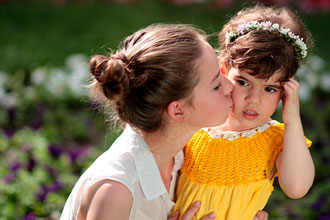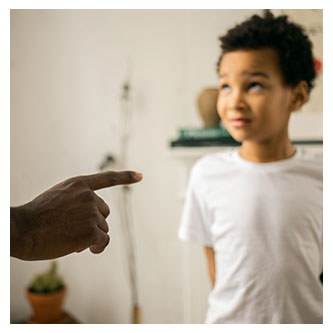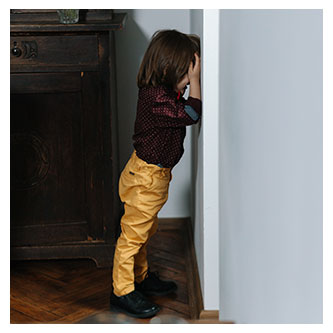Educating with Love

Are you developing the right skills in your children?
Before we begin, we will do a little exercise:
Mentally, think about all those skills, characteristics and values that you would like your child to have in his or her day-to-day life, those skills that you would like to shape the course of his life and turn him into an independent person, with success and rewards to society in a positive way. Do you already have them?
Now, the next question will be just as important as the previous one:
Are you educating your children in such a way that those skills are being formed in him?
"Most parents learn to be parents by walking" (Joan E. 2008, p. 4)
The challenge is enormous; taking by the hand of a human being who has just begun to live and directing him along a path of growth that is often an unknown even for ourselves, does this sound familiar to you?
Suddenly we forget that the course of parenting is nothing more than being a guide and turning the children in our care into good and functional citizens with the ability to fend for themselves in tomorrow leading a life of fulfillment.
Adults or most of us use punitive discipline, Punitive? It is a style of education based on punishment and imposition, which does not take into account the needs of the child and bases its effectiveness on fear. The child acts out of fear of punishment, but does not understand what he has been able to do wrong, and does not develop his own criteria. Punitive discipline can have negative effects on a child's self-esteem, in addition to causing resentment, rebellion, and a desire for revenge. Exposure to stress and trauma can have long-term negative consequences for a child's brain, while talking, reading, and playing with him can stimulate brain growth.
And then it happens that when our son makes a mistake, we remove him to an isolated place measuring the isolation time in relation to his age so that he reflects on what he did, we force him to apologize for any damage he has caused to another, we minimize his feelings when saying "it's a tantrum, you have to learn that things like that don't work with me."
After an interaction with real stress from teaching your child that certain things he does are not correct, the experience can be exasperating, but in reality, these feelings are common and completely understandable in parents, they do not make us feel bad people or bad caregivers or lose control at certain times nor does it make us the worst human beings to handle certain experiences as we have learned, with experience. Although there are thousands of books and websites that promise us the golden path to perfect parenting, the reality is that each home is a small world to explore and our task should be to adapt that theory to our particular situation.

And now, the million dollar question:
At what point do we begin to believe and take for granted that for children to learn they must suffer for it? So what do we want, what is our goal with discipline?
If you stopped to think about it in terms of control, this is the blog that will give you a new panorama and a strategy that will lead to improving the upbringing of your children or the care of children in your charge in a respectful way.
Before continuing and in an informative way, it is convenient to remember some important and very specific rights that protect the healthy childhood of girls, boys and adolescents in an official way, if it is of your interest to know a little more about them, you can find them complete on the page of the CNDH, 2021.
Article VII: Right to live in conditions of well-being and a healthy integral development: Girls, boys and adolescents have the right to live in a healthy and sustainable environment, and in conditions that allow their development, well-being, healthy and harmonious growth, both physical as mental, material, spiritual, ethical, cultural and social.
Article VIII: Right to a life free from violence and to personal integrity: Girls, boys and adolescents have the right to live a life free from all forms of violence and to protect their personal integrity, in order to achieve the best conditions of well-being and the free development of his personality.
What is the first thing that comes to mind when you hear the word discipline?
"The goal of discipline should be to help children become capable, respectful, and cooperative people with multiple life and social skills." (Nelson Jane, 2002, p. 28)
Suppose for example: that your 4-year-old son accompanies you to do the super and passing through that incredible aisle of toys that no child could resist, asks that they buy a car with all their strength and it is, at this moment when Activate the very famous tantrum scene. What are you doing? -If you are on automatic pilot- that is, if you do not manage in clarity of a philosophy about what you will do, why you will do it (what is your objective with this) and how you will do it, perhaps you will manage without too much intention or reflection And then is this the worst parental reaction? No, but it could be better if we manage with the intention of waiting for our children to form important skills and lessons, building their personality and learning the best of each situation, whether it is a tantrum at the supermarket or a fall in the park.
"Positive discipline can help children learn important life skills, such as the importance of taking time to calm down until they are able to think more clearly and act more reflectively." (Nelson Jane, 2002, p. 25)
So an opportunity to learn from the previous example could be as follows:
1 - Anticipation: Are you going to the supermarket and do you know that there can be hundreds of stimuli inside? Anticipate it, talk to your children and comment that they will go to the supermarket but that they will buy only the things that are needed at home, they will not buy toys or sweets or anything that may be attractive to them with the necessary tact so that they understand the situation, it is important that they know what is expected of them in certain situations before they happen.
2 - Breathe: Anticipating wasn't enough and your child is kicking? It allows us to feel the feeling or emotion that arises at that moment, it does not make us bad parents to feel annoyance or displeasure because your child is lying on the floor and crying, you are also a human being, so find calm in each breath Whatever you give, only by staying calm and returning to calm will be the time to truly connect with your children.
3 - Validate the emotion and name it: an example could be: I understand that wanting to have a toy (or the object is the case) and not buying it seems to me that it is making you feel (insert the emotion), right? Sometimes I feel that way too when I don't have something.
4 - It offers options: Well, as we have talked about before, we cannot buy such a thing for now, but what do you think if when we come home we play with your toys for a while together or have a fun moment, offering alternatives that disconnect it from that dominant emotion is a good way to allow self-regulation, also offering a moment of parent-child breathing can be another way to connect.
5 - Offer physical contact: If your child allows it, you can offer a hug, a kiss, a caress or whatever you think will be well received at that time, children and adults also deserve to decide whether they receive it or not, remember that a nurturing mutual respect and love is what we will try to keep in mind all the time.
Encouraging children to solve from the clarity that being aware (not speaking in terms of control) of their emotions allows them to generate positive beliefs about themselves, their world and their behavior and at the same time and thus generate solutions to their problems autonomously and independently, being able as parents to know that children can generate their own solutions is an important step in respectful parenting.
What happens then with the consequences, will I have to let my son do what he wants?
The answer is also part of the method, through the "natural and logical consequences."
Explaining natural consequences is simple and very effective in the learning process. These occur naturally, for example: "when you stand in the rain, you get wet"; "If you don't do your homework, you can do badly at school."
The logical consequences are a bit more complicated. Parental intervention is required when the natural consequence is not appropriate because it can be harmful or can hurt someone (Carrasquillo, 2012).
So what is the best method? CONNECT AND REDIRECT.
The relationship and connection we have with our children will be the key piece in everything we do, when we impose discipline we want to join closely with our children to show them how much we love them, in fact, when they misbehave is when they most often need the connection What you have with them, loving our children and giving them what they need means, in part, proposing clear and coherent limits that establish predictable structures in their lives as well as establishing a greater degree of awareness about their own actions. Knowing that within society there are rules and limits as much as at home will allow them to understand the world: what is acceptable and what is not, being more successful in their interpersonal relationships.
But above all dads, remember that it will always be easier to enforce or for a limit to be met if we are able to set a good example, the probability that a child learns and respects a limit will be more successful when mom and dad also meet their word at all times.
Finally, I leave some important points about the most important criteria of what is and is not positive discipline and within the bibliography some books that will help you on this long road that can make it more enjoyable.

IT IS NOT:
![]() Be permissive fathers and mothers.
Be permissive fathers and mothers.
![]() Have no rules, limits, or expectations.
Have no rules, limits, or expectations.
![]() Beatings or punishments that humiliate the child or feed the belief "suffer to learn"
Beatings or punishments that humiliate the child or feed the belief "suffer to learn"
YES IT IS:
![]() Build parent / adult-child / child relationships in a respectful manner.
Build parent / adult-child / child relationships in a respectful manner.
![]() Help them understand that their brain does not work well when they are angry (also applies for adults).
Help them understand that their brain does not work well when they are angry (also applies for adults).
![]() It teaches self-control and self-discipline.
It teaches self-control and self-discipline.
![]() Teaches skills that will be useful for life (self-regulation, independence, empathy, etc.)
Teaches skills that will be useful for life (self-regulation, independence, empathy, etc.)
Addressing positive discipline in concrete words will always be a challenge for me, but what I have considered the most as a fundamental pillar in this parenting model will undoubtedly be the full mental health of each person who is behind the upbringing of each child in this world. One thing I can say, educating is not easy but not impossible.
It will be necessary to clarify on the other hand, that positive discipline is not a magic recipe with a series of steps and linear ingredients to follow, what to Mom Elsa with her daughter can perhaps serve to Mom Diana with her son, not after all Each person in this world is a unique and unrepeatable being, but there are a series of techniques that are used that can be adapted according to the circumstances in which they happen and above all this philosophy speaks of a mutual growth of parents-children.
A parenting method that completely discards the fear of making mistakes and turns it into a learning opportunity will always be a win-win, it is necessary that for this reason we have adults capable of finding solutions in a humanized way to the challenges that children experience. Considering that it is a developing brain that seeks the most adaptive way of managing its own emotions, does the connection that I generate with my children influence then? Yes, without a doubt it is a fact that generating it will make your children find in you a safe place, a home.
Text by: Denisse Torres, Psychologist.
Bibliography:
Daniel, J. (2015). Disciplina sin lágrimas: Una guía imprescindible para orientar y alimentar el desarrollo mental de tu hijo. Barcelona: Mind Tour Brain.
Joan, E. (2008). Manual de disciplina positiva. Chile: Hibrydo.
Nelson, J. (2002). Disciplina positiva: consejos que invitan a la cooperación entre padres e hijos basados en la dignidad y el respeto. (S/L): Oniro.
Disciplina positiva: ¿Qué es la disciplina positiva?.
Disciplina positiva: Una herramienta para los padres.
Derechos de las niñas, niños y adolescentes.
La importancia de las experiencias en la primera infancia para el desarrollo del cerebro.
Images: pxhere.com & pexels.com
Within our babysitting services, we care about the health and development of your little one, that is why every day we prepare to offer a quality service: always taking a human and professional approach by the hand.
"Nanny Heart - The plus of mom your child needs"
- Details
- Hits: 972
© Nanny Heart 2022 - Website design MGF Creative Solutions. - Políticas de cookies y privacidad


